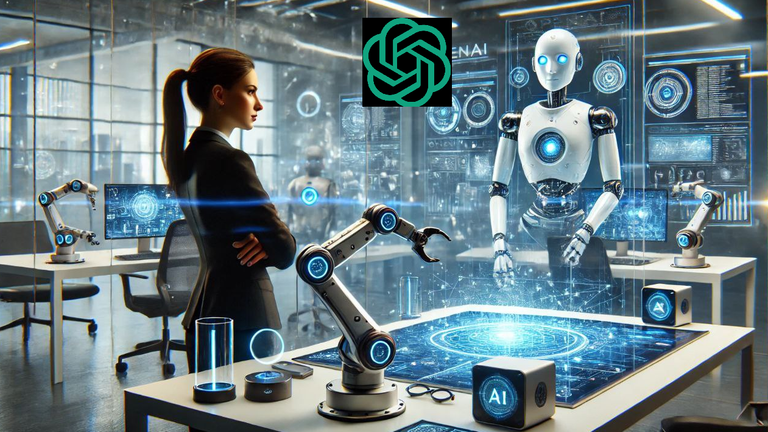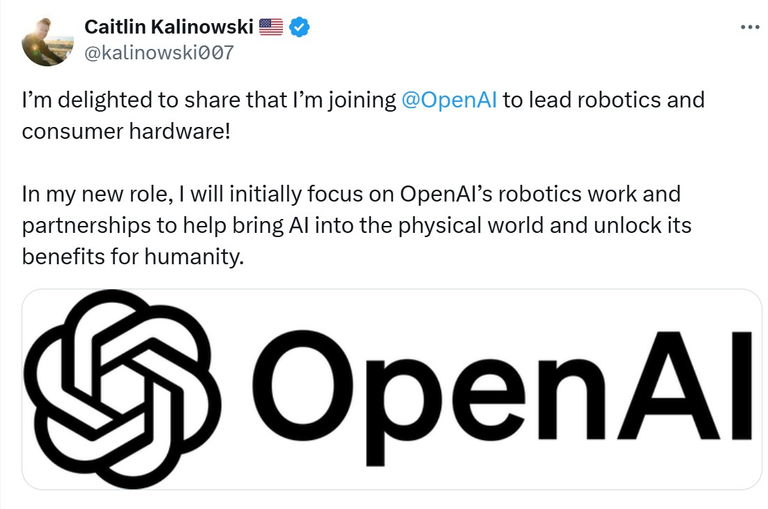KEY FACT: OpenAI has officially launched a consumer hardware division, and engaged the services of former Meta AR leader Caitlin Kalinowski as head of the initiative. With an engineering background in AR technology and prior experience at Meta and Apple, Kalinowski will focus on developing AI-driven consumer robotics. This expansion is OpenAI’s first foray into hardware, aiming to create a market for AI-powered devices. While specifics remain limited, OpenAI might partner with major tech firms to produce its AI-integrated hardware, signaling a shift toward embedding AI deeply in consumer tech.

Image Source: ChatGPT
AI Hardware: OpenAI Launches Consumer Hardware Division
OpenAI has expanded its artificial intelligence (AI) service and product delivery into the consumer hardware sector by establishing a new division. This marks its expansion from software-focused AI models into the physical tech space. To lead this ambitious initiative is Caitlin Kalinowski, a former executive at Meta specializing in augmented reality, who also previously worked at Apple on product design. OpenAI’s move is seen as an effort to make artificial intelligence more accessible and tangible for the everyday consumer, emphasizing potential applications in robotics and other emerging technologies.
The specifics of OpenAI's hardware goals remain under wraps, but the choice of Kalinowski, who has a deep background in design and engineering for consumer technology, suggests a strategic push into innovative, AI-driven products. OpenAI's Consumer Hardware Division is expected to produce hardware that seamlessly integrates with OpenAI's advanced language models, such as ChatGPT, and possibly even applications of GPT-4 and beyond. This alignment with consumer needs may aim to leverage natural language processing to enhance usability in robotics, household devices, or augmented reality, possibly through devices that leverage the flexibility and intelligence of AI to perform complex tasks.

Source: Caitlin Kalinowski on X.com
Kalinowski expressed her excitement in a post on X.com, saying she was “delighted” to share that she was joining OpenAI to “lead robotics and consumer hardware.” It’s unclear what her official title will be, but the division will likely be among the company’s first endeavors in the hardware space.
I’m delighted to share that I’m joining @OpenAI to lead robotics and consumer hardware!
In my new role, I will initially focus on OpenAI’s robotics work and partnerships to help bring AI into the physical world and unlock its benefits for humanity. Source
Her most recently launched project, Meta’s Orion augmented reality glasses, was developed as part of her Meta’s ambitions in the metaverse space, however, it appears her engagement with OpenAI will be more oriented toward consumer robotics. OpenAI's decision continues the company's focus on robotics, which was re-established in June 2024 after the original robotics team was dissolved in 2020-2021.
OpenAI's approach to hardware development follows in the footsteps of other tech giants that have expanded from software to hardware. For instance, Google introduced its Pixel line of smartphones and other AI-powered hardware, while Meta has been investing in VR headsets under the Quest brand. However, OpenAI's hardware ambitions appear to focus specifically on bridging the gap between digital and real-world AI applications in a way that encourages interaction and trust in everyday life.
This strategic shift comes amid increased competition and partnerships in the AI industry, as companies rush to capture the growing consumer demand for smart, AI-empowered products. If OpenAI succeeds, it could set a new standard for AI-integrated devices that provide seamless, personalized experiences.
Previous attempts at bringing AI into the physical world have captured consumer interest to varying degrees. But, so far, hardware featuring advanced AI systems such as OpenAI’s ChatGPT has failed to reach mass market appeal. Let's watch the unfolding innovations around the AI space as they get more interesting.

If you found the article interesting or helpful, please hit the upvote button, and share for visibility to other hive friends to see. More importantly, drop a comment below. Thank you!
This post was created via INLEO, What is INLEO?
INLEO's mission is to build a sustainable creator economy that is centered around digital ownership, tokenization, and communities. It's Built on Hive, with linkages to BSC, ETH, and Polygon blockchains. The flagship application: Inleo.io allows users and creators to engage & share micro and long-form content on the Hive blockchain while earning cryptocurrency rewards.
Let's Connect
Hive: inleo.io/profile/uyobong/blog
Twitter: https://twitter.com/Uyobong3
Discord: uyobong#5966
Posted Using InLeo Alpha
I've been alive for close to 4 decades, seeing this shifts in technology is really breathtaking. Now, AI is soon to becoming handy.
that's an interesting advancement, i think it's a logical step & was expected to happen at some point even f no 1 knew when, i think they will aim for personal assistant robots that will b able to do the cleaning, cooking, teaching & many other human tasks, i think there will a contest with other companies like neuralink, & even with countries like china, russia, japan, korea. interesting post- well done.